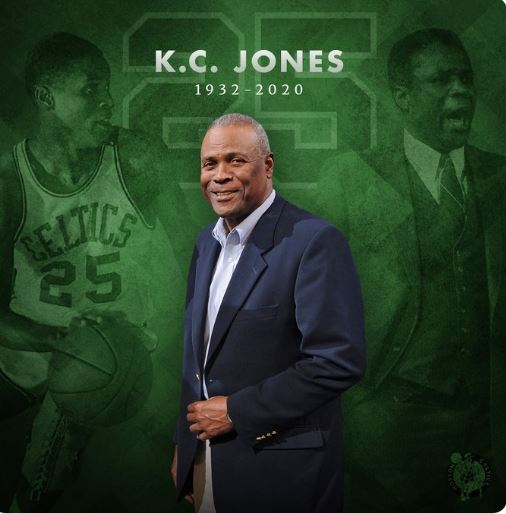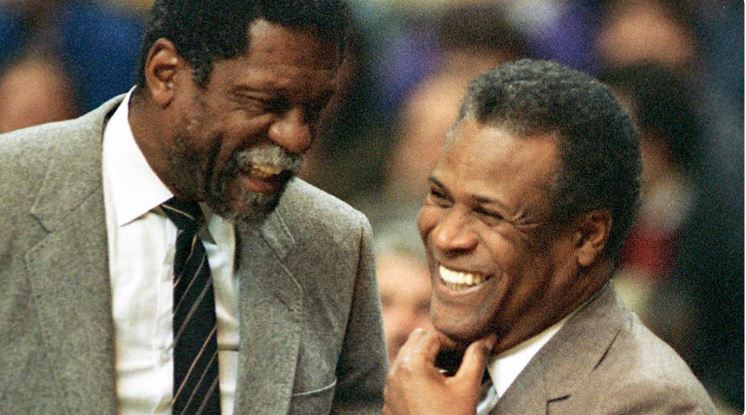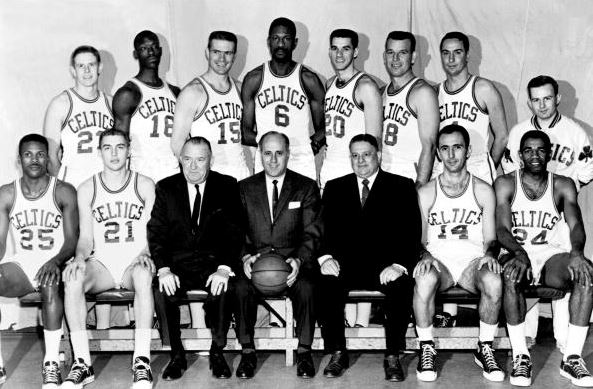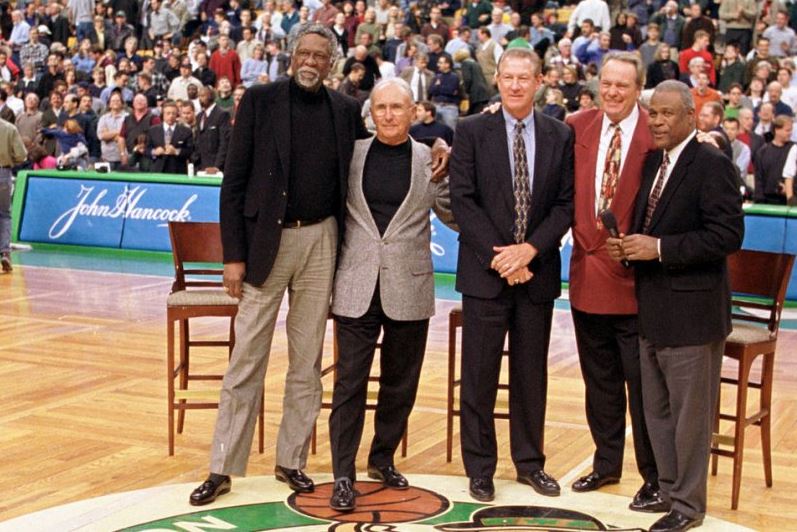
HARTFORD, Conn. – When K.C. Jones died on Christmas morning at 88 years old, another Boston Celtics Hall of Famer Larry Bird said the defensive stalwart was “the nicest man I’ve ever met. His greatest accomplishment was being a wonderful person.”
I fully understood what Bird meant as I was fortunate to know Jones while covering the American Basketball League’s New England Blizzard for The Hartford Courant in the late 1990s. The Blizzard’s home courts were in Hartford and Springfield, Mass., and the Eastern Conference beat the Western Conference 81-65 in the ABL’s first All-Star Game at the then-Hartford Civic Center on Dec. 15, 1996.
Wherever the Blizzard traveled, the first media request was for Jones, who decided to coach the team despite being settled for life. The quiet-spoken former point guard never refused a request because he knew how much it meant for the fledgling league to have its marquee spokesperson help it fight to stay afloat against the WNBA, which had far more financial backing and media exposure but paid its players an inferior salary, which sadly continues to this day.
“To get an NBA legend in the ABL is a huge coup,” league co-founder and CEO Gary Cavalli told The Courant in 1997 after convincing Jones to coach a women’s team for the first time. “He will impact the coaches and players and adds great credibility in showing the ABL is the place to be.”
Jones was also an avid golfer who often asked to play in charity events, including the Greater Hartford Open, now Travelers Championship. In fact, he loved the game so much that he lived in a condominium alongside the third hole at Gillette Ridge Golf Course in Bloomfield. He died at age 88 in an assisted living facility in Connecticut, where he had been receiving care for Alzheimer’s disease for several years.

Before their game against the Brooklyn Nets on Friday afternoon, the Celtics had a moment of silence for Jones. Longtime teammate and friend Bill Russell, the Celtics’ all-time legend, tweeted his condolences to Jones’ family and included what he said was their last photo together. “Friends for life,” Russell wrote. Ironically, the ABL unexpectedly folded midway through its third season three days before Christmas in 1999.
Though never held in the reverence of other Celtics greats such as Russell, Bird, Bob Cousy, Tommy Heinsohn, Kevin McHale and Robert Parrish largely because he was a defensive specialist, Jones was a legend in his own right. He was part of 12 NBA championship teams as a player and coach and earned two NCAA rings and one Olympic gold medal while playing with Russell at San Francisco. That makes Jones one of only eight players to achieve basketball’s “Triple Crown,” leading to the standing joke that the “C” in K.C. stood for championships.
“K.C. Jones was among the most decorated champions in the history of our game,” NBA commissioner Adam Silver said in a statement. “K.C.’s extraordinary accomplishments and impact will long be remembered.”
Jones won eight NBA titles as a player and three as a coach, an assistant in 1981 and head coach in 1984 and 1986, thanks mainly to Bird, McHale and Parrish. He also won a title as an assistant with the archrival Los Angeles Lakers in 1972, is tied for third all-time for most championships won by a single player and is the only black coach other than Russell to capture multiple NBA titles.
Jones and Russell won NCAA titles at San Francisco in 1955 and 1956, and Jones then had a two-year stint in the Army. Jones, Russell and Sam Jones (no relation) were the only Celtics players to be on all eight of the consecutive championship rosters. They also were part of the first all-black starting lineup in NBA history, though K.C. was rarely included in such star power because his offensive numbers didn’t catch anyone’s eye.

“I just didn’t see how a man who shot so poorly as K.C. could stay in the NBA,” Cousy said in 1983. “I really didn’t think his other skills would be enough to keep him around. But I was wrong. The man turned out to be amazing on defense and eventually learned to score enough so that rival teams couldn’t afford not to guard him.”
Jones retired after the eight-title streak ended in 1966-67 at age 34 and was inducted into the Naismith Basketball Hall of Fame in 1989 as a player and the College Basketball Hall of Fame in 2006. The only other players to win a NCAA, NBA and Olympic title are Russell, Michael Jordan, Magic Johnson, Anthony Davis, Clyde Lovellette, Jerry Lucas and Quinn Buckner.
Jones grew up in a poor family in Texas during the Depression, and he was named after his father who had been named after legendary engineer Casey Jones. He parents separated when he was 9, and he moved with his mother and siblings to San Francisco.
“There he learned to play basketball on a patch of gravel in an impoverished neighborhood,” a NBA profile said.
After the Celtics retired his No. 25, Jones began his coaching career at Brandeis University in Waltham, Mass., from 1967 to 1970. He was an assistant at Harvard in 1970 and 1971 and then reunited with former Celtics teammate Bill Sharman as the assistant for the 1971-72 champion Lakers. During that season, the Lakers won a record 33 consecutive games, and he then became the first head coach of the ABA’s San Diego Conquistadors on Aug. 8, 1972.
One week after Jones’ only season with the Conquistadors ended, he resigned and signed a three-year contract to succeed Gene Shue with the Capital Bullets, who became the Washington Bullets in 1974. In his three years in Washington, the Bullets had a 155-91 record and arguably the most talented team in the league. But after the Bullets were swept by the Golden State Warriors in the 1975 finals and lost in seven games to the Cleveland Cavaliers in the Eastern Conference semifinals, Jones’ contract wasn’t renewed, and he was replaced by Dick Motta.

In 1983, Jones replaced Bill Fitch as Celtics coach and guided the team to titles in 1984 and 1986, when he led the East team over the West squad 139-132 in the NBA All-Star Game in Dallas.
The Celtics won the Atlantic Division in all five of his seasons as head coach and reached the NBA finals in four of the five years. Surprisingly, he retired after the 1987-88 season and was succeeded by assistant coach Jimmy Rodgers.
Jones spent one season in the Celtics front office, then resigned to join the Seattle SuperSonics as an assistant coach and basketball consultant for the 1989-90 season. He coached the Sonics for two seasons, and in 1994, he joined the Detroit Pistons as an assistant coach for one season. The Pistons head coach was Don Chaney, whom he had played with on the Celtics. In 1996, Jones returned to the Celtics as an assistant coach for one season.
A year later, Jones became head coach of the Blizzard through their last 11/2 seasons, and his players included Jen Rizzotti of Fairfield and Kara Wolters and Carla Berube from Massachusetts, all of whom were on the University of Connecticut women’s team that won the first of the school’s record 11 national titles in 1994-95. The Blizzard made the playoffs in his second year as head coach but were eliminated by the San Jose Lasers.
While on a trip to Seattle with the Blizzard, radio announcer Dan Lovallo and I had lunch at a restaurant on a pier overlooking the Navy yard. As we walked through a shopping market, I noticed a card shop. And whose card was in the middle of the front window? K.C. Jones. When I told K.C. what Dan and I had discovered, Jones broke into a familiar wide smile, but to this day, I kick myself for not buying the card and giving it to K.C.
After the ABL folded, Jones retired again to the golf course but then “unretired” and became a special assistant to University of Hartford director of athletics Pat Meiser, who knew the importance of having such a significant presence around the program. He assisted the university with fundraising and also did color commentary on the radio at basketball games. Jones and his wife never left Connecticut as long as he lived.
“In my time with him, traveling with him, you never ever heard him say anything negative or unkind about anyone,” said Meiser, who retired in 2014. “He was so sweet. He just really leaves an amazing career. We were so grateful the Hartford Hawks had a chance to be a part of it.”
Ironically, K.C. was born on May 25, 1932, and he died on Dec. 25, 2020. Something about No. 25 and K.C. Jones. RIP to one of sports’ all-time classiest, professional and winning individuals that I feel lucky to have known and chatted with on numerous occasions.











Leave a Reply